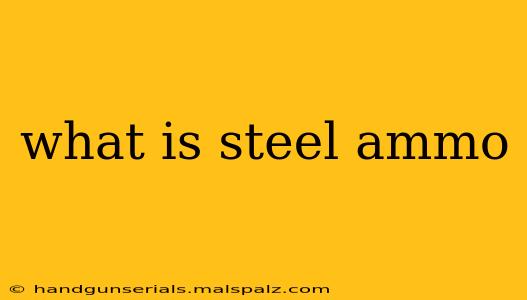Steel ammo, also known as steel-cased ammunition, is a type of firearm cartridge where the cartridge case is made from steel instead of the more traditional brass. This seemingly small difference impacts several aspects of shooting, from cost and performance to environmental considerations and legal restrictions. This guide will delve into the details of steel ammo, explaining its benefits, drawbacks, and important considerations for shooters.
Understanding the Composition of Steel Ammo
The core difference lies in the casing material. While brass cases are known for their resilience, reloadability, and relatively consistent performance, steel cases offer a different set of properties. Steel casings are typically made from low-carbon steel, often coated with polymer to prevent corrosion and improve feeding reliability. This polymer coating also helps reduce friction within the firearm's chamber.
Advantages of Steel-Cased Ammunition
Several factors contribute to the popularity of steel ammo, primarily its cost-effectiveness:
-
Lower Cost: Steel is significantly cheaper than brass, resulting in a lower price point for steel-cased ammunition. This makes it an attractive option for budget-conscious shooters who engage in high-volume practice.
-
Abundant Availability: Due to the lower manufacturing cost and readily available materials, steel ammo tends to be more widely available, especially during periods of high demand or supply chain disruptions.
-
Durable Construction (in certain applications): While not as strong as brass in all respects, the steel casing provides adequate durability for many applications, particularly in full-metal-jacket (FMJ) rounds.
Disadvantages of Steel-Cased Ammunition
Despite its advantages, steel ammo also presents certain drawbacks that shooters should be aware of:
-
Reduced Reloadability: Steel cases are generally not reloadable. The process of resizing steel cases is often more difficult and potentially damaging to both the case and reloading equipment. This limits the economic advantages for shooters who reload their own ammunition.
-
Potential for Increased Wear and Tear: While polymer coatings mitigate this, some firearms are not designed for steel-cased ammunition, and using it could lead to accelerated wear and tear on components like the firing pin, extractor, and chamber. Always consult your firearm's manual before using steel ammo.
-
Magnetic Properties: The steel casing is magnetic, which can interfere with some types of firearm cleaning and maintenance, and make it less desirable for use in certain situations.
-
Environmental Considerations: While not inherently "bad" for the environment, steel casing can contribute to environmental pollution if improperly disposed of. The polymer coating adds a layer of complexity to recycling or proper disposal processes.
Legal Considerations and Restrictions
In some jurisdictions, the use of steel-cased ammunition is restricted or prohibited in certain hunting situations or competitions. Always check local and state regulations before purchasing or using steel-cased ammunition. Some ranges also prohibit steel cased ammo due to concerns about wear on their equipment.
Choosing the Right Ammunition: Steel vs. Brass
The choice between steel and brass ammunition depends entirely on your individual needs and priorities. If cost is the primary concern, and your firearm is compatible, steel ammo offers a viable and affordable option for practice shooting. However, for hunting, precision shooting, or competitive events, the superior reloadability and consistent performance of brass ammunition might outweigh the cost difference.
Always prioritize safety and consult your firearm's manual before using any type of ammunition. Understanding the characteristics of steel ammo is crucial for responsible and informed shooting practices.

